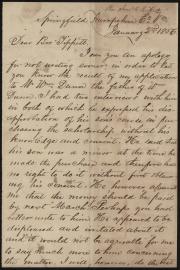"Reunion Address Class of 1870," by Edward Byrn

Edward Wright Byrn delivers this reunion address in 1910 for the Class of 1870.


Edward Wright Byrn delivers this reunion address in 1910 for the Class of 1870.

Professor Charles Himes writes Professor William Fisher a "strictly confidential" letter to discuss several sensitive issues related to Dickinson College.

Professor Charles Francis Himes writes Professor William Fisher to discuss a controversy related to how the Dickinson College Board of Trustees decided to fill faculty positions.

The papers of the Board of Trustees of Dickinson College, 1833-1879, include correspondence, reports, financial statements, printed materials, and legal documents, and have been arranged into thirteen series.
Series 1 – Membership contains correspondence regarding membership on the Board of Trustees, lists of members, and attendance records.
Series 2 – Reports to the Board of Trustees consists of reports by the college president on the overall status of the college as well as reports from the heads of the college departments.
Series 3 – General Business includes bound and loose copies of minutes of the trustees’ meetings, resolutions passed by the various trustee committees, and correspondence in which general business is conducted.
Series 4 – College Personnel includes materials dealing with the college presidents.
Series 5 – Physical Plant consists of deeds, mortgages, certificates, bills, and correspondence dealing with the construction of the campus buildings.
Series 6 – Financial Affairs contains reports of the treasurer, ledger books, student accounts, and other financial materials.
Series 7 – Scholarships contains hundreds of scholarship certificates as well as correspondence and reports related to the sale of scholarships to raise funds for the college.
Series 8 – Conferences consists of materials which pertain to the control of the college by the Baltimore and Philadelphia Conferences of the Methodist Church.
Series 9 – Honorary Degrees contains correspondence relating to the granting of honorary degrees to prominent individuals.
Series 10 – Publications contains printed materials produced for use by the general community such as lists of college rules and regulations.
Series 11 – Dickinson Preparatory School contains reports of the principal to the Board as well as such financial materials as the treasurer’s list of students.
Series 12 – Dickinson Commercial College includes ledger books used in conducting the business of the commercial department of the college.
Series 13 – Executive Committee contains two bound volumes of the minutes of the Executive Committee of the Board of Trustees.
A fuller description of each series is given before each series inventory.

The Education Fund played a critical role in the success of Dickinson College, especially during the mid-nineteenth century. For thirty years, Dickinson was entirely dependent upon the interest from the Education Fund to support its operations. In subsequent decades Dickinson’s Board of Trustees would introduce additional means of raising revenue for the school, but the Education Fund continued to serve as a source of income for the college and its students.
This collection is arranged into six categories as follows: Governance, Correspondence, Finances, Scholarships, Director of Religious Life, and Miscellaneous Materials. Within each category the material is arranged chronologically.

In the nineteenth century, the activities pertaining to admissions and student affairs were performed by the President of the College, with some assistance from the other faculty members. Inquiries concerning admissions were generally made directly to the President of the College. Members of the faculty (including the President) supervised students both inside and outside the classroom. Besides taking attendance, delivering lectures, and grading students, faculty members also monitored students’ behavior and managed the financial accounts of underage students. Communications with parents and other day to day affairs were handled directly by faculty members. This state of affairs lasted until the early twentieth century, when the College began establishing separate offices to handle the necessary paperwork for running an institution of higher learning with an ever increasing enrollment. For ease of access, the following Student Affairs/Registrar papers, representing the period prior to the modern college office system, have been assembled into one record group.
The Student Affairs/Registrar 1783-1914 Record Group is organized into seven series:
Series 1 - General Student Affairs
Series 2 - Matriculation/Registrar
Series 3 - Attendance and Deportment
Series 4 - Grades
Series 5 - Student-Patron Accounts
Series 6 - Individual Students
Series 7 - Admissions